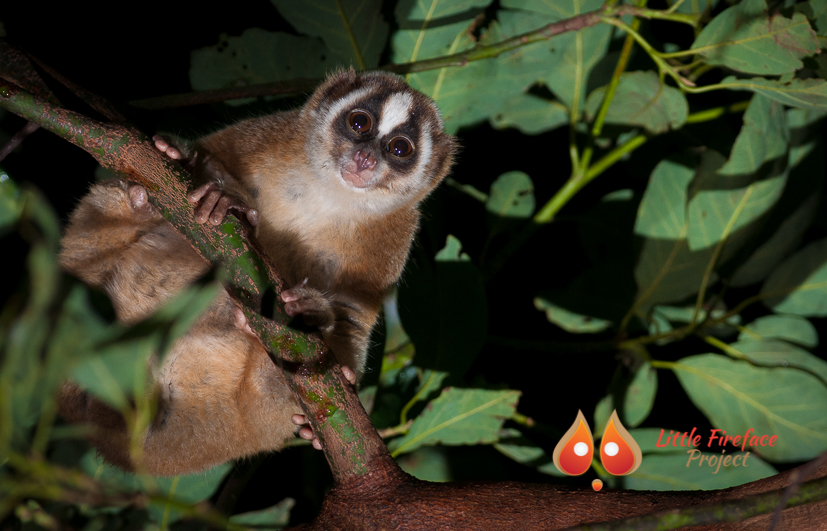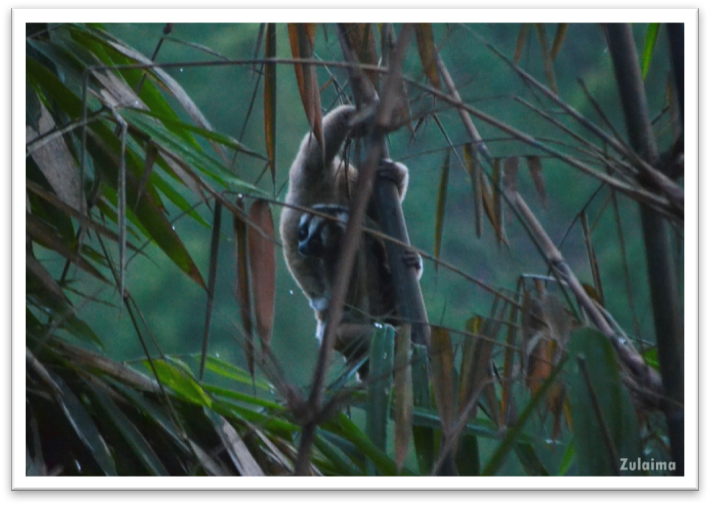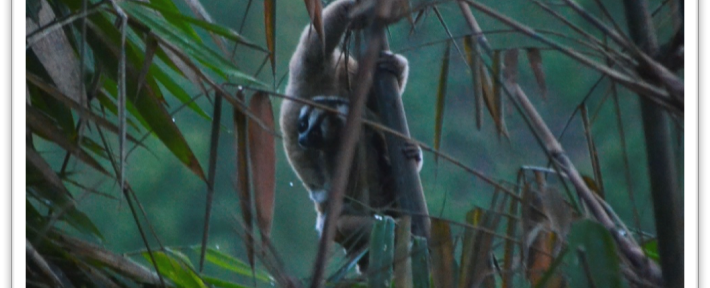
Hi to everyone reading my blog, hopefully it will deliver a message about why we should care about wildlife, especially the Javan Slow Loris “Kukang Jawa” and also what we can do to save them from any kind of threat of being extinct. Firstly, let me introduce myself, my name is Carala Rosadi, I’m Indonesian and a Forestry Student that focuses in Forest Resource Conservation in Universitas Gadjah Mada, Yogyakarta, Indonesia. I started to be interested about wildlife when I’m in the last semester because I want to do something different that I’ve never done before. That’s my reason for deciding to come to Cipaganti, Garut, West Java and take part in wildlife-related activities and volunteer for the inspired and gorgeous project I’ve heard of – the Little Fireface Project. Hopefully you’ll enjoy reading my story, and help to improve your compassion to the Javan Slow Loris and also encourage you to work together with us to save them from extinction.
In the beginning, I didn’t know what kind of animal a loris was and that my lovely country had a species of these beautiful animals – the Javan Slow Loris. They are one of the endemic species (native) of Indonesia where their ideal habitat is. In addition, Javan Slow Loris are categorized as likely to became extinct (Based on International Union for Conservation of Nature “IUCN”). They have an endangered status and it means we should be concerned and do something to help them to change this status. I know, you’ll ask about why we should keep them and why does it matter if they become extinct? That’s my big question too when I don’t understand things related to wildlife, the ecosystem, the life cycle, etc. I have tried to learn even though I know I may not be able to understand everything, so I will try to tell you what I have learned from the perspective of a student who cares and really wants to participate actively in conservation of the slow loris.
Firstly, if we talk about biotics, we can’t just think about human, we have to remember there are other animals and organisms like plants. All of that can’t live well without abiotic components. The combination is essential for our planet. In each component that is biotic and abiotic, life cycles exist which are related and support each other for living. From that simple explanation hopefully, you can see how if we lose these cycles it has severe consequences for our planet. I know you’ll ask again, how does the Javan slow loris life cycle relate to us humans? I know my explanation looks like just a theory, you want to know the evidence. Let me try to answer based on what I’ve learned whilst spending time at this Project. The Javan Slow Lorises real habitat is primary or secondary forest, even though I thought they could maybe live in the semi-forest like in gardens or farm land but as I see the lorises, I see that they like to stay in bamboo, gourd plants, avocado plants but mainly other types forest trees. Because you know what’s also the problem in Indonesia? The fragmentation of the forest land and the changes of land function. So that’s why the Loris in Cipaganti currently has to adapt to live in the farmland. Lorises can help farmers keep their crops from the spread of infection because they eat many insects considered pests. If you want to know more about the works of that, then you can access much literature about lorises!
Then, let me share my personal opinion about loriss. They are very cute and I am always happy to see them. I have loved seeing them play, travelling, feeding, grooming, having social behaviour with other lorises. The cutest times are when they are carrying their babies.

Believe me guys, I never imagined before I could see the special animal that only lives in my country, specifically directly seeing them in the wild and I can agree with my friends that have seen them before about how cute they are and of course makes me want to let them live free in the wild. Remember that just because they are cute – they are not meant to live for your entertainment. They shouldn’t be taken from the wild and be kept as pets.
Definitely, that is totally wrong, please remember that. Don’t forget about the reason why they are important in life cycle and they function best in the wild. Come on guys, please change your perception about cute things, especially animals like lorises, their cuteness will always be there and we can see it best when they are in their real habitat and not with or near humans. Just imagine if you had to live in the same place forever that you hated or maybe if the situation changed that you must live solely in the wild and never with other humans, what would you do? How would that make you feel? I don’t like to imagine that terrible situation – neither should the lorises. They are the same: “One eye, Alomah, Tereh, Lupak, Lucu, Fernando, Shirley, Mikio, Java, Jogya, Toyib, Tzatziki, Daenerys, Tombol, Maya KW, Rufio, and all other lorises just want to live where they naturally belong, in the wild!

I have been at the Green House – the home of the Little Fireface Project more than one month. In this project, I have many activities during the day but also during the night including observations, rounds, and market survey. In the beginning it felt a little bit hard about to trek up the mountain, especially during the night, but when we found the loris directly in the wild for the first time in my life, suddenly I never felt tired again. Why? Yup, because of everything that I told you in the beginning of my story. So, I don’t need to tell you again my reason why I’m so glad I came to help with this project. As I said before, I’ve seen many behaviours, postures and locomotion of the collared lorises here. One of LFP Coordinators has taught me how to observe these behaviours properly and tested me so I make my own observations on my solo shifts. Yeah, I just want to say thanks to Helene and Sharon for believing in me and my abilities to be a successful volunteer and help provide data for this project. I only do shifts 3 times a week as I am also conducting my own university project for BSc. Even though I don’t get to spend 100% of my time working with the lorises I am still having the most memorable experience. I’ll miss the project even moments like when I first went on second shift it was a little bit scary for me when I heard any kind of sound that I didn’t know. Sometimes it is very cold in the day, because it is high up in the mountain so you can imagine the cold in the late night. As well as observing the lorises I am able to interact with the trackers (locals from the village) on my shifts as well. We talk about many topics, as I have much to learn and this helps us ignore the cold and the scary noises and make the shifts more comfortable. I want to say my impressions of the trackers that work at LFP. I am happy to have listened to their inspirational stories about working for the project and their care to help save the Javan Slow Loris. Based on their story, I learnt some good lessons that have opened my mind and given me such compassion for all wildlife, not only the lorises. I love hearing any kind of story based on real experience because it will motivate me to do better in my future and also made makes me want to deliver my message to help people understand. I felt like I haven gotten a new family that I never could imagine before and I have never once felt homesick whilst being here. Being here has allowed me to practice my communication in the English language and learnt brand new words as the family here are not only Indonesian. Practice makes perfect Guys, so it has been precious time to raise my English skills.
In addition, I have been working on my project about the relationship humans have with birds, particularly birds kept by humans and the Sundanese culture surrounding it. I went to houses with birds kept as pets and informally interviewed them about their pets and how they view birds. I also have been going to a bird market in Garut with Abdullah to observe sellers and buyers and understand if there are any rules, such as whether protected species (government rule UU No.7 1999) are being sold or not.
I have been here a month and I can understand why we can’t just think and give an opinion and state that we “care”, but that we need to start acting! Who? All of us, not only the people studying wildlife or lorises, but the entire population in my country and of course globally too. My purpose of this blog is to share what I have learnt, how I’ve felt and deliver this message to you. I just want to say thank you for the chance I’ve had to learn so many new things at LFP. I feel very lucky and grateful for that.

